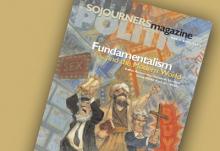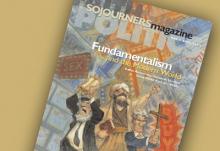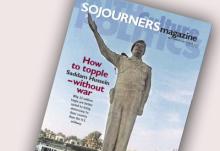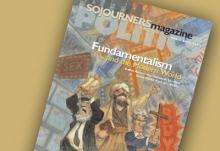Imagine a packed elementary school auditorium and only an hour between hundreds of kids and summer vacation. "Peace" isn't the word that comes to mind.
Feature

Recently a newspaper in Washington, D.C., carried a four-part series titled "Black Money."
Many Christians who support Israel out of a fundamentalist Zionism forget that they have Palestinian brothers and sisters in Christ who suffer under the occupation. Collective punishments through fences, walls, checkpoints, and curfews fail to distinguish between the violent and the nonviolent. Israeli soldiers often do no better, as civilian casualties mount in their war on terror.
"We are all traumatized," said Elias Mishrawi, a Christian Palestinian businessman and political activist from Beit Sahour. "We no more know what is normal life.... Not only do I not see a light at the end of the tunnel. I don't see a tunnel."
While such despair is prevalent among Palestinians, following are the stories of three Palestinian Christians living and working in hope of peace while confronting the violence of occupation.
On April 4, 2002, Rev. Mitri Raheb was detained by Israeli soldiers as they ransacked the compound of Christmas Lutheran Church in Bethlehem, smashing windows, computers, and artwork. That attack, and the curfews that followed, have set back, but not squelched, a vision rooted in nonviolence and "contextual theology."
After a seminary education in Germany gave him answers to questions his people weren't asking, Raheb asked himself: What is good news for people who hear bad news every day?
The Christians of Isulan were out for revenge. A young Muslim had stabbed a Christian youth, and Christian adults were determined that Muslims would pay for the crime. As Christians and Muslims faced each other, raised their guns, and took aim, Bernie Eliseo knew he had to act quickly. He stepped between the two groups, facing his fellow Christians.
"If you insist on killing our Muslim neighbors, you're going to have to kill me too," he told them. Startled, both groups lowered their weapons. A potential bloodbath was averted by the selfless response of one determined peacemaker.
Eliseo, a community leader, had learned mediation skills at a workshop called "Panagtagbo sa Kalinaw"—Culture of Peace—which has since been offered in communities throughout Mindanao, the southernmost of the larger Philippine islands. Christians, Muslims, and members of indigenous groups who attend the workshops reflect together on the harmful stereotyping of one another that can lead to violence. They study the history of the diverse religious and cultural groups in Mindanao and articulate their dreams for peace among those groups. Finally, they learn mediation strategies and engage in role-playing to practice their new skills.
Former Treasury Secretary Paul H. O'Neill, an embarrassment to the Bush administration, was among the first to comment publicly on the Enron debacle in 2002, with a sound bite that is likely to endure as a signature statement of the market ideology of the Bush years:
"Companies come and go; it is part of the genius of capitalism."
The comment was a powerful disclosure of the governing ideology of our society. We may observe of that sound bite:
1) O'Neill spoke without any hint of irony. He seemed genuinely to believe his own mantra.
2) At the same time, however, we had to credit O'Neill, a consummate insider, with an immense cover-up in his utterance. He innocently suggested that capitalism is an unfettered system that operates unencumbered, all by itself. O'Neill, however, did not live in a bubble of isolation. He undoubtedly knew of the multiple covert manipulations by the key market players in their influence upon government, whereby the cards are stacked for the big ones and against the little ones.
3) One is struck in his sound bite by a remarkable lack of empathy for those who genuinely lose and suffer when "companies go," for the "going" is not simply a statistical fluctuation, but a huge displacement that includes loss of job and savings, and often thereby loss of home. O'Neill's dismissive slogan continued:
"Part of the genius of capitalism is people get to make good decisions or bad decisions, and they get to pay the consequences or to enjoy the fruits of their decisions."
How will the global community develop sustainable social structures for an aging population?
Kadd Stephens, 24, longs for "a world free from violence." An anarchist from Washington, D.C., Stephens numbers himself among an increasingly visible group of anti-corporate-globalization activists whose dreams of world peace coexist—critics say illogically—with strategies of violent resistance.
The upswing of anarchist sentiment within the anti-corporate-globalization movement has nonviolent religious activists uneasy. While supporting the aims of the movement—whose concerns range from animal rights to corporate reform and environmentally responsible trade—persons of faith are questioning the assumption of the new anarchists that peaceful ends justify violent means. Some feel the movement has been "hijacked by street tactics," says Robert Collier, who has covered international trade policy for the San Francisco Chronicle.
In criticizing violent activists, however, religious and other nonviolent protesters are coming under fire for their refusal to welcome a "diversity of tactics." Many perceive themselves in a no-win situation. If they embrace the anti-corporate-globalization movement without qualifiers, they compromise their nonviolent commitments; but if they take a stand against violent protests, they risk splintering a transnational coalition for economic, social, and environmental justice.
In response to this dilemma, some nonviolent activists are taking a closer look at the militant new face of activism, hoping to educate themselves and the public about the costs of a pro-violence stance. What motivates some anarchists' rejection of nonviolence in favor of what critics see as little more than random acts of vandalism?
Anarchism
A political theory holding all forms of governmental authority to be unnecessary and undesirable and advocating a society based on voluntary cooperation and free association of individuals and groups.
Black Bloc
A collection of anarchists that organize together for a particular protest action. Their goals are to give an anarchist critique of issues and to provide solidarity in the face of what they consider repressive police action. Black is the color of anarchism.
White Overalls
A movement of disenfranchised European youth organized against the economics of neo-liberalism. They wear white overalls as a symbol of the invisibility of most of the world's work force and other protective apparel, like foam rubber armor, to ward off police batons.

Fair-trade and shade-grown: good words for impressing your tree-hugging, java-loving friends. But do you know enough to convince the co-worker who's sold on Starbucks?

Architecture students at Alabama's Rural Studio raise shelters for the spirit.
It is a morning ritual for thousands of Americans, a gateway into the day, the warm cup over which they connect with others. But for drinkers of Pura Vida, that cup of coffee is also a ray of hope for at-risk children in the impoverished and struggling neighborhoods of San Jose, Costa Rica, and across the United States.
While some socially responsible businesses are able to boast a charity- or justice-oriented mission that grows out of their established consumer base, Pura Vida is an example of a for-profit business that was developed explicitly to support a religious and social mission.
In Spanish, "Pura Vida" has a double meaning. In street parlance, it means "cool," "awesome," or "great." But it also translates as "pure life" in English. Founders John Sage and Chris Dearnley seek to embody both meanings in the company's products, marketing, and social justice activities.
Pura Vida was founded in 1997 by Sage and Dearnley, who had met 10 years earlier when they both joined the Graduate School Christian Fellowship at Harvard Business School. After graduation, the two went their separate ways—Sage to work for Microsoft and into the high-tech start-up world and Dearnley first into business consulting and then, in 1995 after becoming an ordained minister, to Costa Rica, where he started a Vineyard church.
But the business school friends stayed in close contact, each looking forward to their annual get-togethers. In July 1997, relaxing by the pool after a round of golf in San Diego, Dearnley found himself telling Sage about the work he was doing in San Jose with at-risk youth, providing meals for the hungry and reaching out to struggling children. The work was rewarding but the group was financially strapped, Dearnley reported.

Young Christians are pushing the edges of faith. Here's a glimpse into the hearts and dreams of a few of them, in their own words.

Christians around the world are being attacked and churches burned to the ground. Is anyone paying attention?




